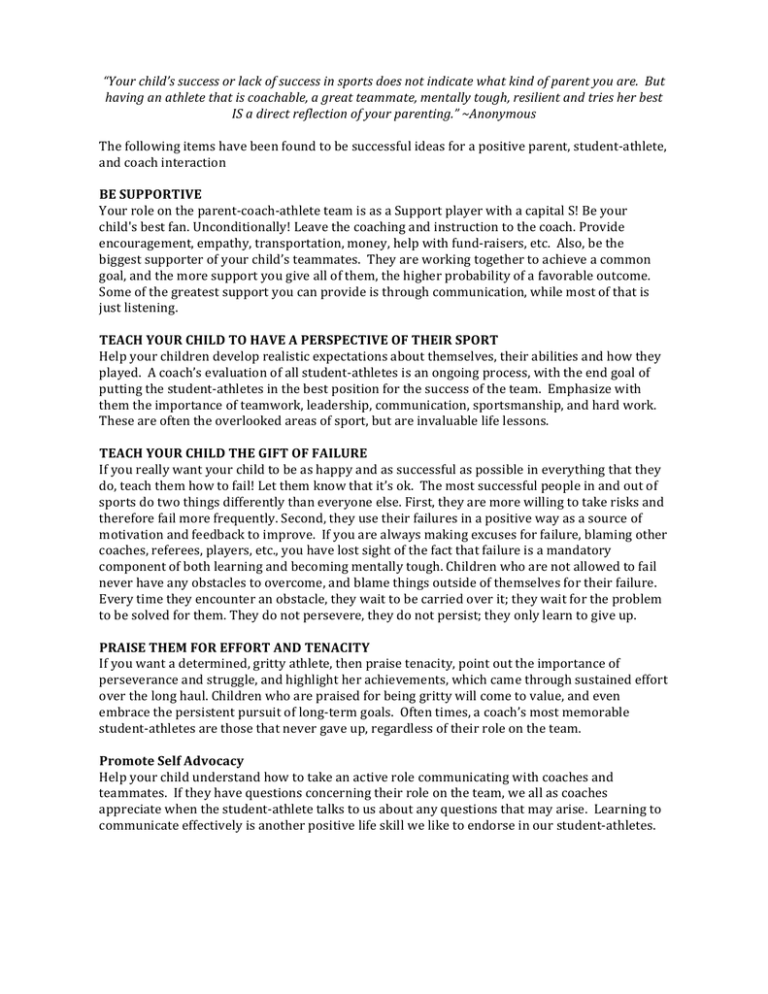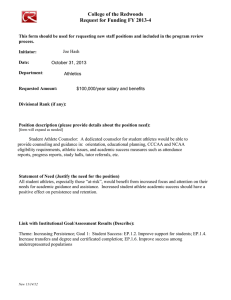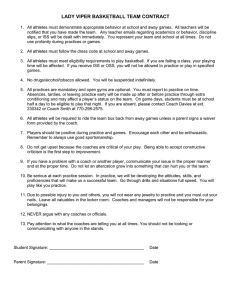Your child`s success or lack of success in sports does not indicate what
advertisement

“Your child’s success or lack of success in sports does not indicate what kind of parent you are. But having an athlete that is coachable, a great teammate, mentally tough, resilient and tries her best IS a direct reflection of your parenting.” ~Anonymous The following items have been found to be successful ideas for a positive parent, student-­‐athlete, and coach interaction BE SUPPORTIVE Your role on the parent-­‐coach-­‐athlete team is as a Support player with a capital S! Be your child's best fan. Unconditionally! Leave the coaching and instruction to the coach. Provide encouragement, empathy, transportation, money, help with fund-­‐raisers, etc. Also, be the biggest supporter of your child’s teammates. They are working together to achieve a common goal, and the more support you give all of them, the higher probability of a favorable outcome. Some of the greatest support you can provide is through communication, while most of that is just listening. TEACH YOUR CHILD TO HAVE A PERSPECTIVE OF THEIR SPORT Help your children develop realistic expectations about themselves, their abilities and how they played. A coach’s evaluation of all student-­‐athletes is an ongoing process, with the end goal of putting the student-­‐athletes in the best position for the success of the team. Emphasize with them the importance of teamwork, leadership, communication, sportsmanship, and hard work. These are often the overlooked areas of sport, but are invaluable life lessons. TEACH YOUR CHILD THE GIFT OF FAILURE If you really want your child to be as happy and as successful as possible in everything that they do, teach them how to fail! Let them know that it’s ok. The most successful people in and out of sports do two things differently than everyone else. First, they are more willing to take risks and therefore fail more frequently. Second, they use their failures in a positive way as a source of motivation and feedback to improve. If you are always making excuses for failure, blaming other coaches, referees, players, etc., you have lost sight of the fact that failure is a mandatory component of both learning and becoming mentally tough. Children who are not allowed to fail never have any obstacles to overcome, and blame things outside of themselves for their failure. Every time they encounter an obstacle, they wait to be carried over it; they wait for the problem to be solved for them. They do not persevere, they do not persist; they only learn to give up. PRAISE THEM FOR EFFORT AND TENACITY If you want a determined, gritty athlete, then praise tenacity, point out the importance of perseverance and struggle, and highlight her achievements, which came through sustained effort over the long haul. Children who are praised for being gritty will come to value, and even embrace the persistent pursuit of long-­‐term goals. Often times, a coach’s most memorable student-­‐athletes are those that never gave up, regardless of their role on the team. Promote Self Advocacy Help your child understand how to take an active role communicating with coaches and teammates. If they have questions concerning their role on the team, we all as coaches appreciate when the student-­‐athlete talks to us about any questions that may arise. Learning to communicate effectively is another positive life skill we like to endorse in our student-­‐athletes.


